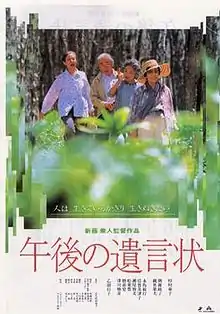A Last Note
A Last Note (午後の遺言状, Gogo no Yuigon-jo) is a 1995 Japanese film directed by Kaneto Shindo. It was chosen as Best Film at the Japan Academy Prize ceremony.[2]
| A Last Note | |
|---|---|
 Theatrical poster for A Last Note (1995) | |
| Directed by | Kaneto Shindo[1] |
| Produced by | Yasuo Ibata Kiesi Mizogami |
| Written by | Kaneto Shindo |
| Starring | Haruko Sugimura Nobuko Otowa |
| Music by | Hikaru Hayashi |
| Cinematography | Yoshiyuke Miyake |
| Distributed by | Nihon Herald Eiga |
Release date |
|
Running time | 112 minutes |
| Country | Japan |
| Language | Japanese |
Plot
A retired actress, Yoko, played by Haruko Sugimura (famous for her appearance in many Ozu films), visits her summer home. Her husband, played by Masahiko Tsugawa, has recently died. Her friends Tomie, another retired actress, and her husband Fujihachiro visit the summer home as well as Toyoko. Tomie is senile and can barely hold a conversation or remember her friends' names, although she can eat with gusto.
An escaped prisoner with a pistol invades the house and demands food from the women at gunpoint. Tomie grabs his pistol, and he is then captured by police. The prisoner turns out to have been a mental patient who had attacked residents of an old people's home driven mad by their incessant playing of a croquet-like game called gateball. The ladies receive a reward for helping to capture the prisoner, but are disappointed to find that it is only 10,000 yen rather than the hoped-for 300,000 yen.
Tomie and her husband leave the summer house. Yoko gets Toyoko to confess that Toyoko had an affair with Yoko's husband. Toyoko tells Yoko that Akemi, her daughter, is the daughter of Yoko's husband. Akemi, who brings groceries to the summer house, is getting married. The two elderly women visit the marriage ceremony and watch various traditional stylized costumed dances of sexual rituals.
A visitor to the house, Naoko, played by Mitsuko Baisho, informs Yoko and Toyoko that Tomie and her husband have committed suicide. The husband withdrew all his money from his post office savings and spent it on a luxury stay at a hotel before drowning himself and Tomie by walking into the ocean. Yoko, Naoko and Toyoko retrace their final steps. During the trip, they are reconciled and Yoko decides to try to continue her acting work.
Cast
- Haruko Sugimura: Yoko Morimoto
- Nobuko Otowa: Toyoko Yanagawa
- Hideo Kanze: Fujihachiro Ushiguni
- Kyoko Asagiri: Tomie Ushiguni
- Toshiyuki Nagashima: Police
- Mitsuko Baisho: Naoko Yazawa
- Yutaka Matsushige: Daigoro
- Tomomi Seo: Akemi
- Katsumi Kiba: Prisoner
- Kōichi Ueda: Chief Police
- Masahiko Tsugawa: Saburo Morimoto
- Masaaki Uchino: Koji Kiyokawa
Production
The house in the mountains was director Shindo's actual mountain retreat, and is the same building as the old man's house in Tree Without Leaves.[3]
Reception
The film won the awards for Best Film, Best Director, Best Screenplay and Best Supporting Actress at the 1996 Japan Academy Prize.[4] It was also nominated for Best Editing. It also won the award for Best Film at the 1996 Blue Ribbon Awards, the 1995 Hochi Film Award for Best Film, and the awards for Best Film, Best Director, Best Actress and Best Supporting Actress at the 1996 Kinema Junpo Awards. It was also entered into the 19th Moscow International Film Festival.[5]
References
- Infobox data from 午後の遺言状 (in Japanese). Japanese Movie Database. Retrieved 2009-05-14. and Gogo no Yuigon-jo (1995) at IMDb
- "Awards for Gogo no Yuigon-jo (1995)" (in Japanese). Internet Movie Database. Retrieved 2009-05-05.
- Shindo, Kaneto (2012). Nagase, Hiroko (ed.). 100 sai no ryugi [The Centenarian's Way] (in Japanese). PHP. ISBN 978-4-569-80434-7.
- 第19回 日本アカデミー賞 (in Japanese). Japan Academy Prize. Archived from the original on 23 December 2008. Retrieved 18 January 2009.
- "19th Moscow International Film Festival (1995)". MIFF. Archived from the original on 2013-03-22. Retrieved 2013-03-20.
External links
- Gogo no Yuigon-jo (1995) at IMDb
- A Last Note at AllMovie
- 午後の遺言状 (in Japanese). Japanese Movie Database. Retrieved 2009-05-14.
- 午後の遺言状 (in Japanese). www.walkerplus.com. Archived from the original on 2009-08-12. Retrieved 2009-05-14. External link in
|publisher=(help) - 午後の遺言状(1995) (in Japanese). allcinema.net. Retrieved 2009-05-08.
- 午後の遺言状 (in Japanese). Variety Japan. Retrieved 2009-05-14.
